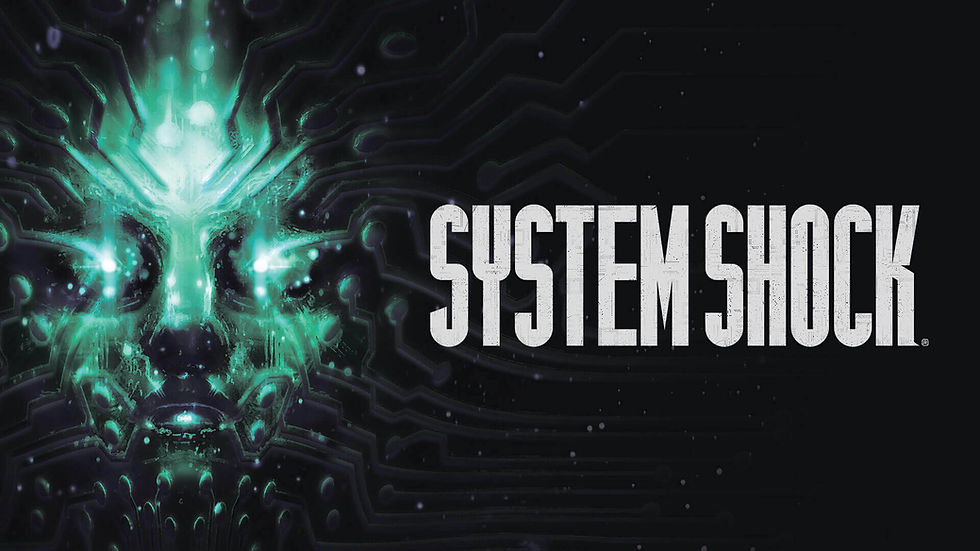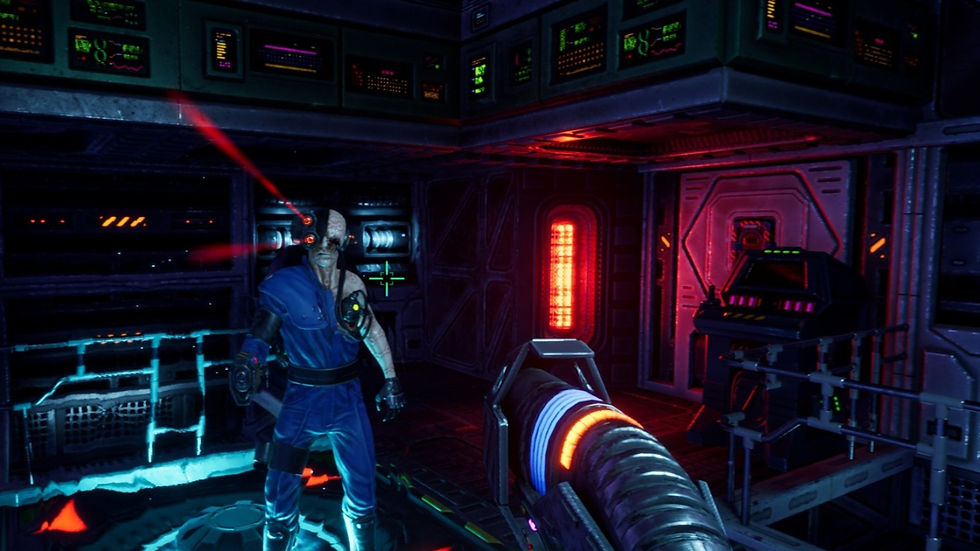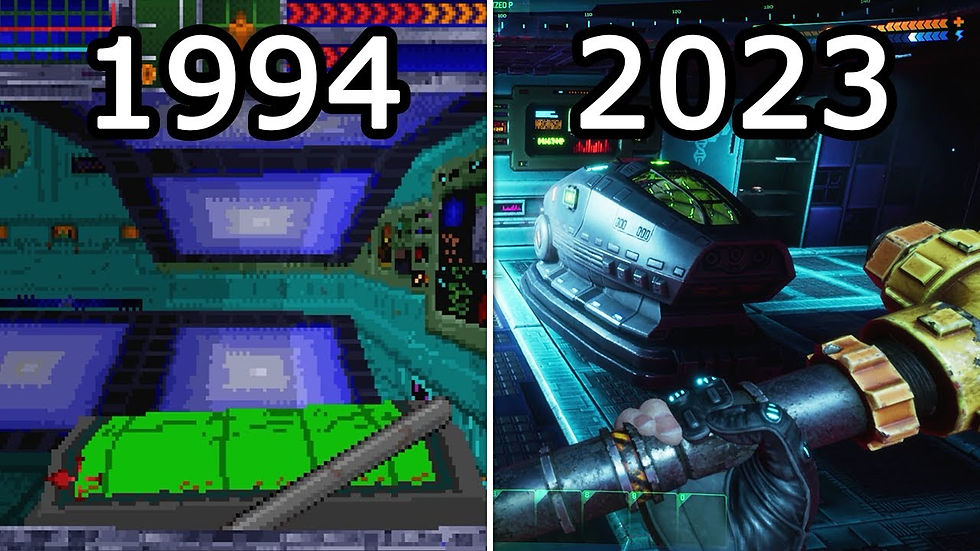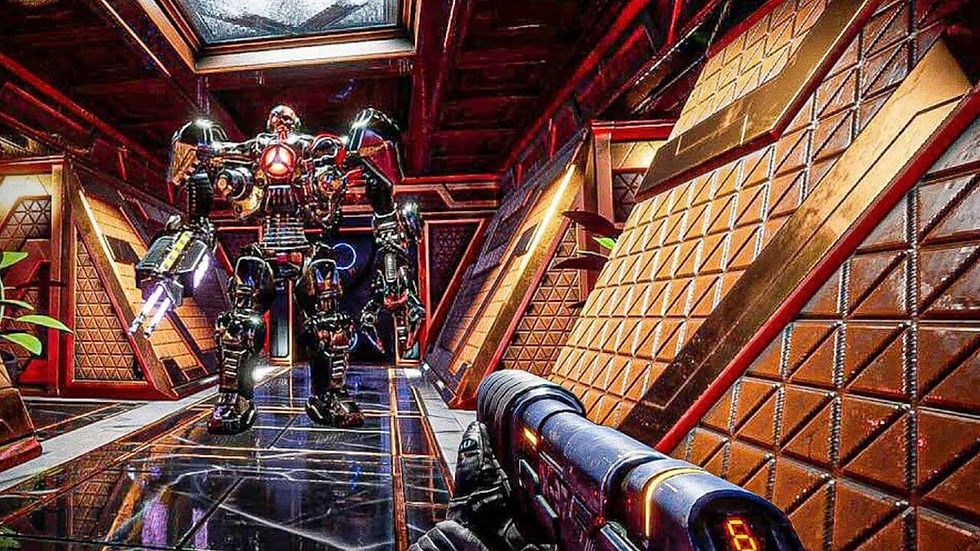
At the time of its original release back in 1994, I didn’t have a computer that would have been able to run System Shock, nor did I know what that game would become; I remember seeing the box and not thinking much about it at the time. Oh, how wrong I was. System Shock ‘94 was the precursor for one of my most beloved franchises, Bioshock. So getting a code for review for the remake of System Shock, I was extremely excited to see what would lead to some of my greatest gaming memories.
System Shock takes place in the far-flung future of 2070, where end-stage capitalism reigns supreme, corporations rule the landscape, and some kind of mining laser hovers over Earth. You, as a “kewl d00d” hacker, are brought in by the TriOptimum corporation by the Marketing VP named Edward Diego. As he and his security forces caught you being bad while you were trying to make off with a military-grade neural interface, he makes a deal with you: he’s got a job for you to complete. In return for you doing this job, he’ll have TriOptimum’s gold-class surgeons install the neural interface you were trying to take off with and let you go scot-free, and all you need to do is to turn off the security subroutines on the AI running TriOptimum’s Citadel Station floating over the planet Earth. You do the hack, the security for the AI (named SHODAN) goes down, and you get put into a six-month coma on Citadel station to recover.

Well, six months later, you awaken to find thanks to your hack, the AI has become self-aware and taken on a bit of a god complex, deciding the substandard human race needs to be eradicated. But not completely, of course, because the AI needs an army of worshippers to do her bidding, so she starts capturing and rebuilding humans into mostly mechanical cyborgs under her complete control. So it’s a good time up in Citadel station. Your job is to take back control of the station and keep SHODAN from annihilating the population of the planet of Earth.
Capcom has set the golden standard for what we now consider a “remake” with their Resident Evil 2 and Resident Evil 4 remakes. When reviewing a remake like this, it almost feels like you have to do more of a conversation about what constitutes a remake. Compared to the 1994 version of System Shock, this 2023 remake is a godsend. However, looking at the quality-of-life changes that should have been made to make the gameplay a little smoother, they’re just not there.
Graphically, leaps and bounds better than the 1994 version of System Shock, but where it should be in 2023? Felt like they stopped upgrading the graphics from a hopped-up Playstation 2 version of the game. Maybe the decision was on purpose, as it is obviously far more expensive to try and make realistic assets, but the graphics don’t feel great. One of the big annoyances with the graphics for the System Shock remake is there was very little thought into differing up the level designs. I understand that in the lore of the game, you’re on a space station, and all of the floors look nearly identical. But simply doing a color swap between floors to indicate a difference between the maintenance floor and the medical bay feels cheap. And also confusing. Not every floor even bothers to change things up at all, so you can quickly forget which floor you’re on at all outside of just remembering the map layout.

The developers for System Shock wanted to make this as “old school” of a game as possible, so there’s no quest log. There’s a list of collectible audio messages and emails that you can scan back through and try to figure out where you’re supposed to go next, but there are no clear objectives laid out. If you’re not paying attention or falling asleep while you’re playing, it gets very easy to lose track of what you’re trying to do. Unfortunately, I’m not 12 anymore and don’t have six weeks to learn every inch of the game, so a point in the right direction from time to time would have been extremely useful. Video games have come a long way as far as handholding and signposting in games, sometimes to a fault. I absolutely would have played through System Shock if it had pointed me in the right direction every once in a while. I ended up having to dig up old guides from the original 1994 version and hope there was enough connective tissue between the two versions of the game that I could understand where to go next.
There is also a pile of glitches and bugs that make the game somewhat unpleasant. Many of my hacker skills I would unlock or earn during the playthrough wouldn’t work. Regarding my “cyberspace” abilities, I still don’t understand what the “retreat” and “rampage” (if those are their names, I can’t remember, “left alt” and “R” buttons) do, because I would mash on those buttons and get no response. When I went in to change the layout of the keys, the key would change, but the tooltip that would pop up would not. So while I changed the button for “take all things off corpse” from “F” to “C,” the text would still pop up “F” as the tooltip when I’d try to loot a corpse. It would fix itself when I would restart the game, but still.
System Shock sports a “Tetris” style inventory management system of blocks where you’re forced to move items around your backpack to fit everything in. Everything generally takes up one slot, but weapons and larger pieces of kit take up more, and you spend a lot of time manually moving things around instead of playing the game trying to fit gear in your bag. You see, there is no “auto-sort” button that moves everything around for you, another desperately useful quality-of-life upgrade that should have been added to make the game more palatable.

System Shock is also not great for you maniacs out there who love rampaging through a room, collecting every shiny bauble and trinket to sell to a shop, or in System Shock’s universe, every trinket gets broken down into scrap which can be recycled for credits. The problem, again, is one part not having enough room to packrat everything you want, and the other part is not having a way to quickly break down junk that’s on the floor so you don’t have to play “inventory management: the game” every time to try to pick up a coffee pot or scalpel you want to recycle because your bag is filled with guns and ammo. It quickly becomes an unfortunate reality of just leaving that shiny junk behind because it’s not worth the grief of fighting with the game mechanics to clean out every room. There also aren’t exactly a lot of great uses for credits in the game outside of the occasional upgrade machine and health dispenser, so you don’t end up needing to even do so for the most part. But again, another missed opportunity.
Shooting? Hey, let’s talk shooting. It’s not terrible. System Shock does a fairly decent job with the gunplay in the game, but it’s not good or bad enough to make enough of a difference in my wanting to play the game, which is unfortunate.
I did also lose a pile of progress when my save game refused to recognize that I was “out of combat” to use a hacking terminal, something I needed to progress the game along. But the game will not save while you’re “in combat,” so I was forced to use an earlier save and lost about two hours of progress.
The hits really keep coming when it comes to System Shock.
Look, it’s not a bad game. Playing it, one can definitely see the skeletal structure of what would eventually become Bioshock 20 years later. But Capcom has ruined me as far as what a “remake” can be, and System Shock is missing a pile of quality-of-life increases that should be in there to make it playable in 2023, in a world where people’s gaming backlogs of “must play” games are increasing exponentially.

Comments